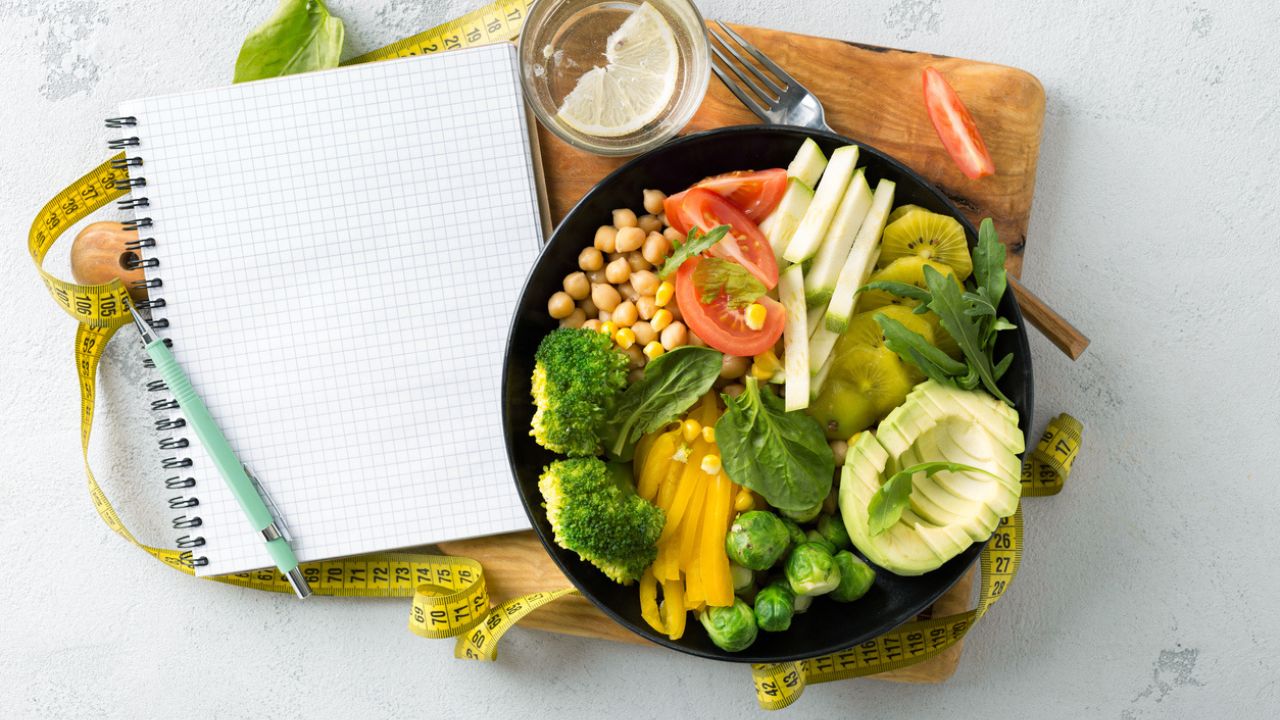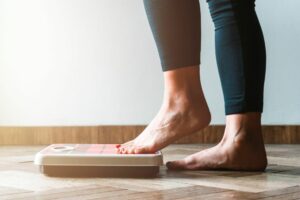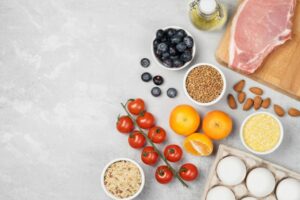Is losing weight easier when you’re clued up on calories? Is a calorie deficit the only answer to long-term weight loss? Lucy Gornall quizzes the experts
If you’re hoping to shed any unwanted weight, then it’s a good idea to get to grips with calorie burning.
After all, weight loss in its most basic terms, involves the body burning more calories than it takes in. This is called ‘calorie deficit’.
However, there is a little more to the weight loss conundrum. But first, what IS a calorie? It’s a word that’s thrown around continually but do you actually know what constitutes a calorie and its connection to metabolism?
Rob Hobson, Sports Nutritionist at Healthspan Elite, explains that put simply, a calorie is a unit of energy.
‘The energy in food is measured in calories which can help people to understand what they need to eat to meet their own personal energy needs,’ describes Hobson.
A faster metabolic rate means a greater calorie burn
Generally, we need a certain number of calories each day to function; the UK’s NHS recommends 2500 calories a day for men and 2000 calories a day for women.
Hobson adds that metabolism is defined as the chemical processes that occur within the body to maintain life. These processes assist in the conversion of food into energy.
‘A lot of energy is used up when at rest as the body is busy performing the tasks that help to keep you alive which includes respiration, growth and repair. This is known as your basal metabolic rate and this can differ amongst individuals,’ explains Hobson.
A person’s basal metabolic rate is essentially the rate of calorie burn when doing nothing. A faster metabolic rate means a greater calorie burn, whilst a slower metabolic rate means fewer calories are burnt.
Read More: Healthista Loves: The Organic Pharmacy
Basic factors affecting your metabolism, and calorie burn
Not everyone burns calories at the same rate; this is where metabolism comes in. However, there are a number of other reasons why someone may burn more calories without even realising they are doing so.
‘Body size is one such factor, for example someone larger will burn more energy,’ Hobson explains.
‘Someone who is overweight or obese will naturally burn more energy when moving for the very fact that it takes more effort to carry the weight around.
‘Having more muscle to fat means you will burn more energy and this is not just at rest but when you are moving too. This is often the reason men burn more energy than women of a similar age and weight because they have a higher muscle mass,’ adds Hobson.
Someone who is overweight or obese will naturally burn more energy
Finally, age too is a contributing factor.
‘Muscle mass reduces with age and at an even greater rate in women during menopause. This drop in muscle mass means fewer calories burnt when you’re moving,’ says Hobson.
This is why maintaining a healthy muscle mass throughout life by staying active and including resistance-based training, is important to maintain the healthy metabolism we all wish for.
Read More: 5 healthy pasta recipes perfect for the weekend
Fancy speeding up your metabolism?
Rob explains that the only really effective way to do this is through exercise and also changing your body composition by increasing muscle mass and losing fat.
As for foods that could boost metabolism, it’s really only a short-lived thing.
‘There are some foods which are often touted as helping you to burn more calories and these include chillies and green tea,’ says Hobson.
‘While they may momentarily increase your metabolism as a result of heat, if we’re talking about chillies, the resultant calorie loss is not really that significant,’ reveals Hobson.
Burning calories in your sleep?
The beauty of calorie burning is that it’s happening all the time. Yes, even when you sleep!
‘The body doesn’t just shut down while sleeping. Energy is still required for many different functions in the body and this really goes back to the basal metabolic rate (BMR),’ says Hobson.
A woman’s menstrual cycle could also influence the basal metabolic rate
If your BMR is high, then you will burn more energy during sleep.
A woman’s menstrual cycle could also influence the basal metabolic rate however Rob says that this seems to depend on the individual.
‘Other research suggests that BMR may increase during the luteal phase of the cycle (between ovulation and the next period) but these differences in energy are very small,’ Hobson adds.
Read More: Can’t sleep? These 20 healthy foods could be the cure
Calorie burn throughout the day
Of course, your BMR isn’t the only calorie burn you’ll experience day to day. Movement, whether that be a planned exercise session or general movement throughout the day such as getting up and walking around, cleaning, cooking and walking up stairs, is a great way of burning calories.
A 30-minute walk can burn up to 189 calories per 30 minutes, whilst a 30 minute run could burn up to 336 calories.
Ultimately though, if you’re hoping to lose weight, a one-hour gym session with the rest of the day remaining sedentary, is unlikely to be enough, unless of course you’re taking in less calories than you burn.
your BMR isn’t the only calorie burn you’ll experience day to day
It’s important to keep moving throughout the day; take a stroll on your lunch break, opt for the stairs instead of the lift, and park a little further away from your destination so you can walk a little more.
You might have heard of certain foods actually causing a greater calorie burn simply by the chewing and digestion process than the calories the food actually contains. Celery is one such food.
The story is that as celery contains so few calories (as it’s really high in water) the energy used by the body to mechanically eat and digest it is greater than what it contains. But Rob explains that this is overexaggerated and unfortunately there is no such thing as a negative calorie food.
What about supplements?
There’s an array of pills and potions on the market said to help burn calories, however Rob says these are somewhat of a myth.
‘Caffeine will increase your metabolic rate for a while as your heart rate is elevated and hormones like adrenaline kick in. This supplement is commonly used amongst athletes,’ reveals H0bson.
Try: Healthspan Elite Kick Start Caffeine Gum, £9.99.
‘In every sport I have been involved in, caffeine has been used to help performance, whether this is consciously or subconsciously,’ says Performance Nutritionist Nigel Mitchell.
Caffeine will increase your metabolic rate for a while as your heart rate is elevated
‘Conscious use would be when an athlete will tactically consume caffeine at specific times; this may be from foods such as coffee or supplements in the form of pills, chewing gum, and combined caffeine and carbohydrate energy gels.
‘Subconscious use would be someone like me having a couple of espressos before going for a bike ride’.
‘If we look at research about caffeine and exercise, we can see it is probably the most researched supplement’, says Hobson.
‘This supplement works as an ergogenic aid improving performance by reducing the perception of fatigue but I wouldn’t rely on it for weight loss’.
Read More: Best diet for menopause – an interview with Dr Clare Bailey
Eating MORE, taking in LESS
Cutting back on the amount you eat can be tough, and often takes some serious willpower! But, you can eat a lot of food without the high calorie count that often comes with big meals.
‘The simplest way to do this is by eating foods with a high-water content as they contain fewer calories but more bulk’, explains Hobson.
‘Salad vegetables are a good example as you can pile them high on the plate to bulk out your meal but eat few calories in the process. The same is true for meals like soups, stews, broths and casseroles. These contain lots of water so as long as they are broth stock or tomato-based then they are a good way to eat more for less if you like’.
The argument against calories
Although calories in vs calories out is the general rule equation for managing weight, several arguments have been put forward as to why calorie counting may not be all it’s cracked up to be.
Research suggests the type of bacteria in your gut influences the number of calories your body actually utilises from certain foods.
‘It has even been found that people who are naturally thin have different microorganisms residing in their gut compared to overweight people,’ Hobson reveals.
He adds that another argument is that your body ‘has a ‘set point’ that governs your weight’.
Biologically, eating less calories than you burn daily puts you into a deficit that incurs weight loss
‘Everything in the body is controlled by the hypothalamus in the brain, which works to keep equilibrium. It’s argued that even if you are dieting and exercising AKA, reducing your calorie intake, there may be a plateau in weight loss as the body fights to keep at the set point’.
This could also be a reason why some people struggle to keep the weight off.
Biologically, eating less calories than you burn daily puts you into a deficit that incurs weight loss. Research has suggested that this concept may not be that straight forward and that how people utilise calories may differ between individuals.
However, calories still offer a simple and very accessible way for people to monitor their overall energy intake.
The fact still remains that to lose weight people need to make adjustments to their diet which inevitably means eating less food while increasing their daily activity to help increase their calorie burn.
Like this article? Sign up to our newsletter to get more articles like this delivered straight to your inbox.

























































